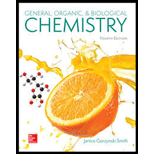
(a)
Interpretation:
The name of an alkali metal in period 6 needs to be determined.
Concept Introduction:
In a Periodic table, there are in total 7 periods and 18 groups. And, in a Periodic table all the elements found in nature are arranged according to increasing
Alkali metals are the metals that belong to group 1 of the Periodic table. General electronic configuration of alkali metals is
Alkali group contains six elements.
These elements are as follows. Lithium, sodium, potassium, Rubidium, Cesium and Francium.
(b)
Interpretation:
The element present in period 5 and group 8 in the periodic table needs to be determined.
Concept Introduction:
In a Periodic table, there are in total 7 periods and 18 groups. And, in a Periodic table all the elements found in nature are arranged according to increasing atomic number.
General electronic configuration of transition metals is
These elements are placed in the middle of Periodic table.
(c)
Interpretation:
The element present in group 7A and period 3 needs to be determined.
Concept Introduction:
In a Periodic table, there are in total 7 periods and 18 groups. And, in a Periodic table all the elements found in nature are arranged according to increasing atomic number.
Group
Elements which belong to this group are Fluorine, Chlorine, Bromine, Iodine, and Astatine.
(d)
Interpretation:
The elementpresent inperiod 2 and group 2A needs to be determined.
Concept Introduction:
In a Periodic table, there are in total 7 rows and 18 columns. And, in a Periodic table all the elements found in nature are arranged according to increasing atomic number.
Elements of group
Elements present in this group are Beryllium, Magnesium, Calcium, Strontium, Barium, and Radium.
(e)
Interpretation:
The halogen present in period 2 needs to be determined.
Concept Introduction:
In a Periodic table, there are in total 7 periods and 18 groups. And, in a Periodic table all the elements found in nature are arranged according to increasing atomic number.
Group
Elements which belong to this group are Fluorine, Chlorine, Bromine, Iodine, and Astatine.
(f)
Interpretation:
An inner transition metalwith one electron in 4f orbital needs to be determined.
Concept Introduction:
In a Periodic table, there are in total 7 rows and 18 columns. And, in a Periodic table all the elements found in nature are arranged according to increasing atomic number.
Elements that belong to lanthanide and actinide series are known as inner transition metals. Elements with atomic number 57 to 71 are all lanthanides whereas elements with atomic number 89 to 103 are all actinides.
Want to see the full answer?
Check out a sample textbook solution
Chapter 2 Solutions
General, Organic, and Biological Chemistry - 4th edition
- Draw the Zaitsev product of the dehydration of this alcohol. + I X 5 OH ざ~ TSOH Click and drag to start drawing a structure.arrow_forwardPlease help with identifying these.arrow_forwardFor the reaction: CO2(g) + H2(g) --> CO (g) + H2O (g) Kc= 0.64 at 900 degrees celcius. if initially you start with 1.00 atmoshpere of carbon dioxide and 1 atmoshpere of hydrogen gas, what are the equilibrium partial pressuses of all species.arrow_forward
- Can I please get this answered? With the correct number of significant digits.arrow_forwardDraw the Hofmann product of the dehydroiodination of this alkyl iodide. ☐ : + Explanation Check esc F1 2 3 I 88 % 5 F5 I. X © tBuOK Click and drag to sta drawing a structure. © 2025 McGraw Hill LLC. All Rights Reserved. Te BI BB F6 W E R Y S H Karrow_forwardCan I please get help with this graph, if you could show exactly where it needs to pass through please.arrow_forward
- Draw the condensed structure of 1,3-dihydroxy-2-pentanone. Explanation Check Click anywhere to draw the first atom of your structure. Х C © 2025 McGraw Hill LLC. All Rights Reserved. Terms of use +arrow_forward0.500 moles of NOCl are placed into a 1.00 L vessesl at 700K and after the system comes to equilibrium, the consentration of NOCl is 0.440 M. Calculate the equilibrium constant Kc for the reaction: 2NOCL (g) --> 2NO (g) + Cl2 (g)arrow_forwardWhat is the hydronium ion concentration in a solution of water that has a hydroxide ion concentrationof 1.0 x 10-2 M?arrow_forward
 General, Organic, and Biological ChemistryChemistryISBN:9781285853918Author:H. Stephen StokerPublisher:Cengage Learning
General, Organic, and Biological ChemistryChemistryISBN:9781285853918Author:H. Stephen StokerPublisher:Cengage Learning Chemistry for Today: General, Organic, and Bioche...ChemistryISBN:9781305960060Author:Spencer L. Seager, Michael R. Slabaugh, Maren S. HansenPublisher:Cengage Learning
Chemistry for Today: General, Organic, and Bioche...ChemistryISBN:9781305960060Author:Spencer L. Seager, Michael R. Slabaugh, Maren S. HansenPublisher:Cengage Learning Chemistry: Principles and PracticeChemistryISBN:9780534420123Author:Daniel L. Reger, Scott R. Goode, David W. Ball, Edward MercerPublisher:Cengage LearningChemistry: Matter and ChangeChemistryISBN:9780078746376Author:Dinah Zike, Laurel Dingrando, Nicholas Hainen, Cheryl WistromPublisher:Glencoe/McGraw-Hill School Pub Co
Chemistry: Principles and PracticeChemistryISBN:9780534420123Author:Daniel L. Reger, Scott R. Goode, David W. Ball, Edward MercerPublisher:Cengage LearningChemistry: Matter and ChangeChemistryISBN:9780078746376Author:Dinah Zike, Laurel Dingrando, Nicholas Hainen, Cheryl WistromPublisher:Glencoe/McGraw-Hill School Pub Co





